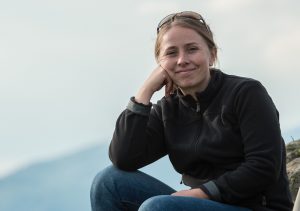Dr. Julia Stewart Lowndes, UC Santa Barbara
Moss Landing Marine Labs Seminar Series - April 5th, 2018
Hosted by the Pacific Shark Research Center
MLML Seminar Room, 4pm
Open to the public
 Dr. Julia Stewart Lowndes is a marine data scientist at the National Center for Ecological Analysis and Synthesis (NCEAS) at the University of California at Santa Barbara (UCSB). As Science Program Lead for the Ocean Health Index (OHI), she works to bridge marine science and resource management. Julia contributes to the science and open data science behind OHI assessments and also leads a training program internationally to enable independent groups to assess ocean health and inform policy in their own waters. Increasingly, she is teaching open data science trainings as an instructor with NCEAS, Software Carpentry (including at MBARI last December!), RLadies, and Mozilla Study Groups (eco-data-science).
Dr. Julia Stewart Lowndes is a marine data scientist at the National Center for Ecological Analysis and Synthesis (NCEAS) at the University of California at Santa Barbara (UCSB). As Science Program Lead for the Ocean Health Index (OHI), she works to bridge marine science and resource management. Julia contributes to the science and open data science behind OHI assessments and also leads a training program internationally to enable independent groups to assess ocean health and inform policy in their own waters. Increasingly, she is teaching open data science trainings as an instructor with NCEAS, Software Carpentry (including at MBARI last December!), RLadies, and Mozilla Study Groups (eco-data-science).
Prior to joining the OHI team, Julia earned her Ph.D. at Stanford University’s Hopkins Marine Station in Pacific Grove, researching potential effects of the Humboldt squid in the California Current System on coastal fisheries in a changing climate. She collaborated closely with her PhD advisor Bill Gilly, as well as John Field, Steven Bograd, Elliott Hazen (NOAA), Bruce Robison and Steve Haddock (MBARI) and many others. She was also heavily involved in the Center for Ocean Solutions’ MARINE program.
You can follow her on twitter: @juliesquid
The power of open data science: experience from the Ocean Health Index
For the past four years, we have dramatically improved how we work with the Ocean Health Index by embracing open data science practices and tools. We now work in a way that is more reproducible, transparent, collaborative, and open, with more emphasis on communication. Because of this, more than 20 countries around the world are building off our science and our code for ocean management in their own jurisdictions.
We’re sharing our story in a recent publication in Nature Ecology & Evolution (Lowndes et al. 2017) because at the time we thought this transformation was intimidating, but we are living proof that it’s possible. By describing specific tools and how we incrementally began using them for the Ocean Health Index project, we hope to encourage others in the scientific community to do the same — so we can all produce better science in less time.

